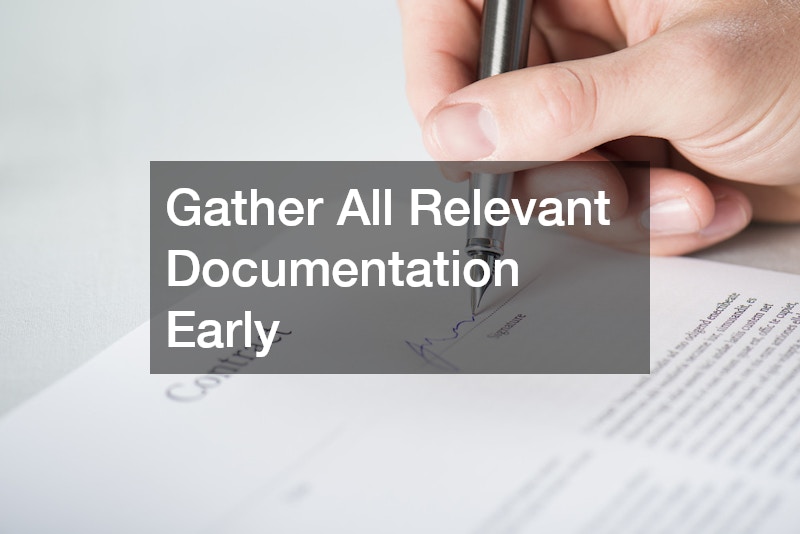10 Smart Legal Tips for Approaching Your Case With Confidence
Legal matters can often feel overwhelming and intimidating. Whether you’re dealing with a minor issue like a building code violation or a major event like a car accident, understanding the intricacies of the legal system is crucial for a successful resolution. This guide aims to provide you with detailed legal tips and insights to navigate different legal scenarios effectively. With the right knowledge and preparation, you can manage your legal interactions confidently and efficiently. We will explore various scenarios, from the importance of hiring specialized car accident attorneys to understanding your rights in building violations. Together, these elements form a thorough framework for approaching legal situations across diverse fields, ensuring you are well-equipped to handle whatever legal challenges come your way.
1. Understand the Nature of Your Case

Having a clear grasp of the nature of your legal case is foundational to managing it effectively. In situations like car accidents, it’s important to ascertain liability and gather evidence to support your claims. Consulting with car accident attorneys can provide essential guidance through each step, ensuring you understand your rights and responsibilities.
Legal tips in such instances often emphasize the value of documenting every detail related to the accident. This includes photographs of the scene, statements from witnesses, and any medical records related to injuries sustained. By collecting comprehensive documentation, you bolster your case and improve your chances of a favorable outcome.
Moreover, understanding the legal terminology and procedures relevant to your case can significantly influence the result. This might involve learning about local traffic laws or insurance requirements. Navigating these complexities with the help of a qualified attorney can make a significant difference in how your case is processed and resolved.
Before taking any legal action, it’s also essential to assess the scope and potential consequences of your case. Understanding whether your situation falls under civil, criminal, or administrative law can determine which court will handle your matter, what procedures you’ll need to follow, and what outcomes are possible. For instance, a car accident case may involve both civil liability and insurance regulations, while a building code violation might lead to administrative penalties or fines. Identifying these distinctions early helps you and your attorney develop a focused legal strategy that aligns with the specific type of case you’re facing. This clarity allows you to prioritize resources, anticipate potential challenges, and ensure you’re pursuing the most effective path toward resolution.
2. Know Your Legal Rights and Obligations
Your fundamental legal rights and obligations form the backbone of any legal interaction. Whether you’re dealing with a building code violation or a dispute over rental agreements, being well-informed is essential. Effective building code violation assistance can help you understand and rectify issues while safeguarding your interests.
Legal tips stress the importance of being proactive about understanding your obligations early on, which helps you avoid common pitfalls that may arise. This often involves consulting with legal experts who can offer tailored advice to navigate the complexities of municipal laws and regulations.
Being aware of your rights allows you to advocate effectively for yourself or your property. Familiarizing yourself with local laws and regulations will empower you to address issues confidently and ensure that your rights are protected throughout the legal process.
3. Gather All Relevant Documentation Early

One of the most important steps in preparing for a legal case is gathering all relevant documentation early. In situations involving auto insurance, having a comprehensive collection of documents can support your claims and expedite the settlement process. This includes insurance policies, medical records, and any forms of correspondence with your insurer.
Legal tips emphasize that maintaining accurate and organized records can greatly assist your attorney in building a strong case. This is particularly crucial in insurance disputes, where documentation can substantiate the details of the incident and the extent of damages or injuries suffered.
Effective documentation helps preempt many common disputes that can arise over coverage, payment timelines, or the extent of liability. Therefore, taking the initiative to gather and organize your documents can significantly streamline the legal process, and in certain cases, it can also lead to quicker case resolutions.
Beyond collecting physical documents, it’s equally important to maintain digital copies and organize them systematically. Scanning receipts, contracts, correspondence, and reports into secure folders or cloud storage ensures easy access for you and your attorney when needed. Many legal disputes can drag on for months, and misplaced paperwork can slow progress or weaken your position. By using digital tools to categorize and store files, you not only safeguard vital evidence but also make it simpler to retrieve supporting materials during hearings or negotiations. This proactive step reflects preparedness and professionalism—qualities that can make a noticeable difference in how smoothly your case proceeds.
4. Keep Detailed Records of Every Interaction
Consistently keeping detailed records of every interaction is invaluable in any legal scenario. In tax-related legal issues, such as when seeking tax preparation services, recording all communication can clarify misunderstandings and support your claims. It is especially indispensable during audits or disputes over filings.
By maintaining a precise diary of meetings, phone calls, emails, and other forms of communication, you can create an incontrovertible timeline of events. Legal tips further suggest keeping copies of any documents, forms, and receipts, which provide proof and clarity should discrepancies arise.
Detailed records ensure you can substantiate your side of the story should conflicts occur. They act as tangible evidence to verify claims and protect your interests, serving as a powerful tool in both negotiation and court settings.
5. Be Honest and Transparent With Your Attorney

Honesty and transparency with your defense lawyer are vital components of a successful legal strategy. Your lawyer’s effectiveness hinges on the accuracy and completeness of the information you provide. Concealment or distortion of facts limits their ability to form an adequate defense or strategy on your behalf.
Supporting legal tips advise against withholding information out of fear or embarrassment, as your lawyer needs a full picture of the situation to advocate effectively. By creating an atmosphere of trust, your attorney can better guide you through the legal maze with informed and relevant advice.
This open relationship helps prevent surprises in court and ensures you are represented to the best of the attorney’s ability. It maximizes your chances for a favorable outcome, as every piece of relevant information is weighed into your defense strategy.
Transparency also extends to sharing all relevant background information, even details that may seem unrelated or insignificant. Seemingly minor facts—like prior legal disputes, financial difficulties, or offhand comments made to other parties—can influence your attorney’s ability to anticipate potential challenges. When your lawyer has a full picture, they can identify vulnerabilities before the opposing side does and craft responses that protect your interests. By contrast, withholding such information can lead to surprises that undermine your defense or negotiation strategy. Open and continuous communication helps build trust and allows your attorney to advocate from a position of complete knowledge.
6. Choose the Right Lawyer for Your Situation
Selecting the appropriate lawyer tailored to your specific legal issue can be pivotal. Legal tips suggest that evaluating potential representatives based on their specialties and past success in similar cases is crucial. Particularly, in complex family disputes, moving accidents, or financial litigation, expertise can make a significant difference in case outcomes.
A lawyer well-versed in the intricacies of your specific legal area can provide nuanced insights and effective strategies specific to your situation. This specialized knowledge is often the key differentiator between a strong and a weak legal approach.
Effective legal representation is not just about hiring any lawyer, but the right one for the task. Consequently, taking the time to research and vet potential attorneys can pay dividends in terms of both case resolution and peace of mind. Sound legal representation ensures that your interests are protected to the fullest extent.
7. Avoid Discussing Your Case Publicly or Online

In the digital age, discretion in public and online discussions about your legal case is paramount. Exposing details related to damage restoration claims or other legal matters can compromise your position. Legal tips warn that public disclosures can inadvertently provide ammunition to the opposing side.
Keeping your legal dealings confidential prevents potential misrepresentation or manipulation of your words. Online platforms can easily spread information beyond your control, negatively impacting public perception of your case and potentially prejudicing judicial outcomes.
This is especially important with social media’s permanence and broad reach, where messages can be misinterpreted or taken out of context. Thus, maintaining discretion not only protects your interests but also supports the integrity of the legal process as it unfolds in your favor.
Even casual conversations with friends, family, or colleagues can unintentionally expose sensitive information. Details shared verbally can be repeated, misremembered, or misconstrued, potentially creating evidence that the opposing side could use against you. Legal tips often stress that discretion applies to all forms of communication, including phone calls and text messages. By limiting discussions to your attorney and essential parties, you minimize the risk of compromising your case and maintain control over how information about your situation is shared.
8. Ask Questions Until You Understand Everything
In any legal process, clarity is essential. When it comes to legal proceedings, like boarding disputes or contract negotiations, don’t hesitate to ask questions until you fully understand every aspect. Legal tips recommend engaging in discussions with your lawyer to dispel confusion and clarify legal jargon or implications.
A thorough understanding enables you to make informed decisions and actively participate in your legal strategy. It minimizes the risk of misunderstandings that could derail your interests and ensures you are fully aware of potential outcomes and consequences.
This proactive approach also fosters a constructive relationship with your legal counsel. By seeking clarity on unclear points, you demonstrate a commitment to understanding the process, thereby enhancing the overall effectiveness of your attorney-client collaboration.
9. Stay Organized Throughout the Legal Process
Maintaining organization throughout the legal process is a cornerstone of successful case management. Organized documentation and timely communication with stakeholders, such as mortgage brokers, can significantly influence proceedings. Legal tips stress the importance of keeping all relevant materials in order to avoid chaotic situations.
Staying organized mitigates the stress associated with legal matters and prevents important deadlines from being overlooked. Centralizing communications and documentation helps ensure that all necessary paperwork is readily available for review and submission.
Additionally, an organized approach allows for more efficient use of resources, reducing redundancies and streamlining processes. It supports a clear and consistent narrative in your legal dealings and enhances your overall preparedness for meetings, negotiations, or court appearances.
10. Stay Calm and Professional Under Pressure
Remaining calm and professional is critical in any legal interaction, especially under pressure. Whether dealing with site owners during property negotiations or other high-stress scenarios, poise and professionalism facilitate productive dialogues. Legal tips suggest developing strategies to handle stress constructively to maintain rational and effective decision-making.
By focusing on facts rather than emotions, you can navigate heated situations with a clearer perspective. This improves interactions with all parties involved and reflects positively on your comportment, potentially influencing case outcomes in your favor.
Professionalism under pressure demonstrates maturity and reliability, which can earn respect and credibility from both your legal team and opposing parties. Cultivating this demeanor reinforces your commitment to achieving justice or a satisfactory resolution and shows that you’re prepared to handle the intricacies of legal proceedings.
Successfully navigating the complexities of legal issues requires preparation, knowledge, and strategy. From understanding your rights and obligations to selecting the right lawyer and maintaining organized records, each step plays a crucial role in achieving favorable outcomes. Whether dealing with car accident attorneys or resolving disputes related to damage restoration, legal tips offer invaluable guidance. By following the detailed advice laid out in this comprehensive guide, you can manage legal challenges with greater confidence and clarity. Taking proactive steps ensures that you are well-equipped to meet the demands and unexpected twists of the legal process. Ultimately, a methodical approach, paired with professional legal counsel, forms the backbone of effective legal management, setting you on a path towards successful resolutions.




Post Comment